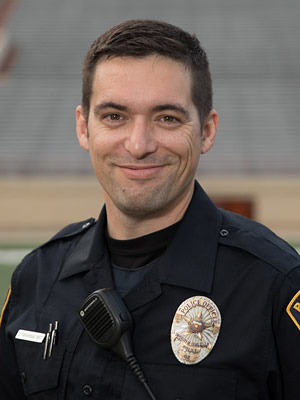
I have the best job in the world. I get to be a Peace Officer in Texas at a pivotal point in the direction of a profession that, at its best, is noble and selfless.
The University of Texas System has been very good to me and to those I care about. It has educated my mother, my father in law, my wife of 18 years, and myself. My wife, my sister, and I all work for the University. Beyond putting food on our tables, discoveries made at many UT campuses have improved our lives. Keeping this community safe is a great purpose.
The lesson I’ve learned since I started working at UTPD in February of 2013 is clear: Not everything that counts can be counted. In fact, it’s those unmeasurable acts of integrity, those moments of vigilance that no one will see, and the unquantifiable way we relate to individuals that really determine if we’re succeeding as a police department.
After serving in the Army as an artillery crewmember, I came to UT Austin as a law student, focusing primarily on criminal law and criminal procedure. Prior to this, I worked in Washington D.C. for the House Judiciary Committee. I got to do some amazing things as a student, such as being elected to the editorial board of the incredible American Journal of Criminal Law, writing sections of legislation voted into law by the United States Congress, and seeing firsthand how the family court system works in Travis County. With all appreciation for these advanced opportunities, something was missing from my life. It wasn’t fulfilling to sit at a distance and read about how the system worked and didn’t work. The rigorous study required at the law school felt tedious and too academic, and I realized the coming career could be an unhappy one. I wanted to be hands-on and make a truly direct difference, the way many people I was reading about in textbooks had made a direct difference. I realized there was nothing stopping me from becoming a police officer myself. Very, very truly, since I figured this out I’ve never really worked a day in my life. I come to work with a smile, and even on the bad days I’m fulfilled in my purpose. Like I said, I have the best job in the world.
I’ve been tasked with training others quite a bit. I’ve trained dispatchers, brand new cadets, lateral officers with decades of experience, and through training them, I’ve learned. I’m a CPR/AED and Taser instructor, and I always jump at the chance to mentor our cadets. I encourage everyone who trains to have an open ear to new ideas, and encourage your trainee to tell you if they think they have a better idea than their trainer. Sometimes they do. And these fresh challenges to the status quo are the truest gut check of the product we’re putting on the street.
Communication has been a consistent area where our profession needs to improve. Chief Carter has created a “District Representative” program at UT Austin that takes what a good beat cop naturally does, and taken it a few steps further in organization and accessibility. Everyone on our campus can easily find out who their patrol officer is from their smartphones. They can email their officer from an online district map. I can barely keep up with Twitter and I don’t know what Instagram is, but our department advertises my availability on social media for me. And believe it or not, students, staff, and faculty do reach out and ask things of me. Their requests often revolve around active shooters, and after many requests for active shooter response presentations, the department sent me to an ALERRT ‘train the trainer’ class on the Civilian Response to Active Shooters Events. Other district representatives and I, all patrol officers working the street, have continually improved how we communicate about this and other safety related matters. I’ve gone from having great anxiety in public speaking to genuinely enjoying each opportunity to have these huge, dynamic, often unpredictable conversations. I really want our students in particular to know what UTPD is really about in an era where the police are often misunderstood and feared. I hope for two things for these students: that they are safe, and that they remember our department and profession warmly when they go forward in their lives.


